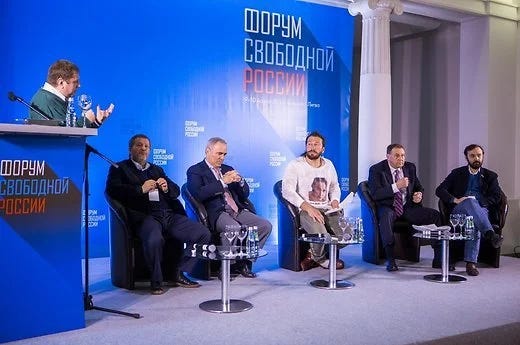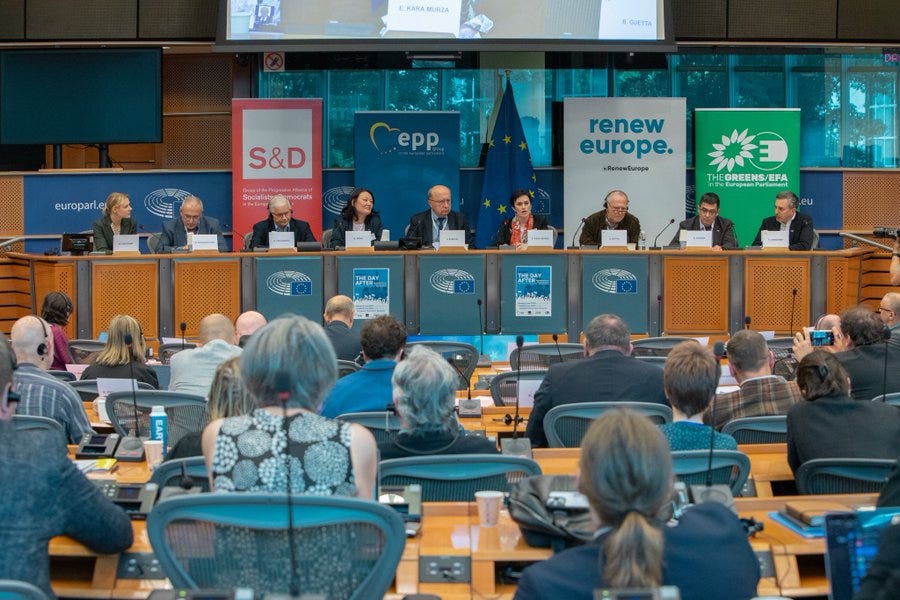Jun 14: Brussels Declaration & the Russian diaspora
Russian lawyers and human rights activists supported the creation of an international tribunal to investigate war crimes in the Russian Federation, and an up-date on the Russian diaspora.
Jun 9: Brussels Declaration
Russian lawyers and human rights activists supported the creation of an international tribunal to investigate war crimes in the Russian Federation. Meduza publishes this document on June 9, 2023.
In mid-March 2023, the International Criminal Court (ICC) in The Hague issued an arrest warrant for Putin for illegally deporting children from the occupied territories of Ukraine to Russia. However, the ICC operates on the basis of the Rome Statute, which Moscow has not ratified., - respectively, the Russian Federation does not recognize its jurisdiction.
Volodymyr Zelensky has repeatedly proposed the formation of an international tribunal to investigate Russia's war crimes. He is supported by the European Commission and the United States: the US Senate is already considering a project to create an international judicial body that could prosecute Russian officials for crimes against humanity.
Ukraine's initiative is also supported by 26 Russian lawyers and human rights activists who consider Russia's invasion of Ukraine an act of aggression and are ready to help the investigation with all their might. In early June, they signed the Brussels Declaration. Meduza publishes this document.
The aggressive war unleashed by the Russian regime against Ukraine has undermined international peace and security in Europe, respect for human rights and international law. We strongly condemn this criminal war that the Kremlin continues to wage in defiance of the decisions of the two main organs of the United Nations, the General Assembly and the International Court of Justice. Moreover, we take note of the conclusions of the International Independent Commission of Inquiry on Ukraine that the Russian side committed war crimes and crimes against humanity during this armed conflict.
We consider it a moral duty towards the victims of these heinous crimes to bring justice, which is an indispensable condition for sustainable peace. The perpetrators of these crimes must be held accountable through, inter alia, appropriate international mechanisms. In this regard, we support the investigation by the prosecutor of the International Criminal Court of the situation in Ukraine. We reject the Russian authorities' threats against the prosecutor and judges of the court.
We emphasize the centrality of the crime of aggression, which has made possible the perpetration of other international crimes on a large scale. The prosecution of political and military leaders who planned, prepared and continue to wage aggressive war, as well as their accomplices, is necessary to ensure justice for the large number of victims.
We remind you that the planning, preparation, initiation and waging of a war of aggression is a crime under general international law and the criminal law of Ukraine and Russia.
Considering that the crime of aggression, by definition, can be committed by the political and military leaders of the state, as well as the inability of the ICC to exercise jurisdiction over this crime in the situation in Ukraine, we support the initiative of Ukraine, other states and international organizations to establish a special international tribunal for the crime of aggression. This initiative is based on international law and the definition of Russia's invasion of Ukraine as an act of aggression by the vast majority of UN member states. Such a tribunal would be able to exercise jurisdiction regardless of the official position of the defendants and the immunities they may enjoy under international and national law.
This war became possible because the grave crimes committed in the past by the leadership and military of Russia on their own land and abroad remained unpunished. The chain of impunity that leads to the repetition of crimes must be broken. We stand ready to help bring perpetrators to justice and redress victims.
Grigor Avetisyan, lawyer admitted to practice at the ICC
Nikolai Bobrinsky, Master of Laws
Gleb Bogush, Ph.D. n.
Andrey Buzin, Ph.D. PhD, Associate Professor
Anastasia Burakova, lawyer, founder of the Ark project
Sergey Vasiliev, Doctor of Law, Director of the Amsterdam Center for Criminal Justice
Grigory Vaypan, Ph.D. n., lawyer
Sergei Golubok, Ph.D. PhD, attorney admitted to practice at the ICC
Daryana Gryaznova, human rights activist, Master of Laws in Human Rights
Dmitry Gurin, lawyer specializing in international law
Sergey Davidis, project manager “Support for political prisoners. Memorial"
Yuri Dzhibladze, expert in international law and international relations, member of the Council of Russian Human Rights Defenders
Stanislav Dmitrievsky, human rights activist
Dmitry Dubrovsky, Ph.D. PhD, Researcher, Faculty of Social Sciences, Charles University (Prague)
Dmitry Zakhvatov, lawyer
Ekaterina Mishina, Ph.D. PhD, professor at the Free University
Karinna Moskalenko, lawyer, human rights lawyer
Maxim Olenichev, human rights lawyer
Vadim Prokhorov, lawyer
Sergei Ross, lawyer, founder of the Collective Action Research Center, director of the Free Russia Research Center in Brussels
Natalia Secretareva, Member of the Board of the Memorial Human Rights Center, Head of the Legal Department (in her personal capacity)
Stanislav Stanskikh, Russian constitutionalist in exile, research fellow at the University of North Carolina at Chapel Hill, visiting scholar at the Fletcher School of Law and Diplomacy
Maxim Timofeev, Ph.D. n.
Daria Trenina, lawyer
Alexander Cherkasov, Member of the Board of the Memorial Human Rights Center (in his personal capacity)
Denis Shedov, Member of the Board of the Memorial Human Rights Center (in his personal capacity)
Shaun Walker, ‘Three months ago, this wasn’t possible’: exiled Russians dare to dream of Putin’s fall—The Guardian
Opposition leaders have begun to plan for the end of the regime – and some believe it is now inevitable.

Is Russia about to experience a period of dramatic political change? If so, can exiled democratic forces unite into a coherent bloc, and is there any way for them to force themselves on to the political scene?
Nearly 300 exiled Russian opposition politicians and activists gathered to discuss these questions in the European parliament earlier this week, the congress coming as news broke of the Nova Kakhovka dam destruction, the latest grim episode in Vladimir Putin’s war on Ukraine.
The Brussels forum, convened by four MEPs, was the first such gathering to be given official status by a European parliamentary body, as some in Europe start thinking about how the contours of a post-Putin Russia would look.
“This is the first time that someone is speaking about the possibility of post-Putinism. Three months ago, this wasn’t possible. EU countries thought that Putin would be president for years and years if not decades and decades … Now, the perception has changed,” said Bernard Guetta, a French MEP who was one of the forum’s organisers.
Mikhail Khodorkovsky, formerly the richest man in Russia before he was jailed for a decade in 2003, said that simply changing Putin for another person from his system would not make any difference.
“This regime should be destroyed,” he said during the opening session. “There is no other road to a peaceful normal future for Russia and for Europe and the whole world.”
The Russian opposition has been saying this for years, and it can often sound like wishful thinking. But with the Russian army on the back foot, drone strikes and military incursions hitting inside Russia and infighting between the elites spilling into the public domain, some in Europe are also beginning to wonder if Putin is as secure in the Kremlin as they had thought.
What a post-Putin Russia would look like is a matter of debate, however. Andrius Kubilius, the Lithuanian MEP and former prime minister who was the conference’s main organiser, said it was still a minority view among European politicians that real democratic change could come to Russia, but he felt it was an important argument to make for the sake of both Russia and Ukraine.
“If big European capitals won’t believe in a possibility of a democratic Russia, which I admit is not so easy to believe at this point, you think either … the same regime will stay in power for ever … or Russia will collapse into total disaster,” said Kubilius.
If western politicians believed a complete Ukrainian military victory would mean the collapse of Russia into an even worse dictatorship or civil war, they “then become scared of Ukrainian victory,” he said.
Some participants of the conference had left Russia more than a decade ago, while others had left after Putin launched his all-out invasion last February. They travelled to Brussels from Berlin, Vilnius, Paris, Tbilisi and many other cities that have become hubs for Russian exiles.
Many participants suggested the collapse of the Putin regime was a matter of when, not if, adding that while the initial post-Putin era might involve a power grab by those in the inner circle, things could soon change quickly.
“Any post-Putin ruler would be significantly weaker in terms of legitimacy and public authority … the regime will try to hold on to power but will not last for long,” said Vladimir Milov, a longstanding opposition politician who was deputy energy minister early in Putin’s rule. “That’s when we need to apply pressure for people to speak up,” he added.
The only Ukrainian at the forum was Oleksiy Arestovych, who resigned in January. He was a former senior adviser to President Volodymyr Zelenskiy. Arestovych dismissed the view – common in Ukraine – that the Russian opposition should be ignored as it shares the imperial mindset of the Kremlin, as “political shortsightedness”. He said it was important to think about how to change the regime in Russia, rather than simply hope for Russia’s disintegration.






